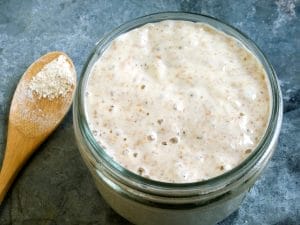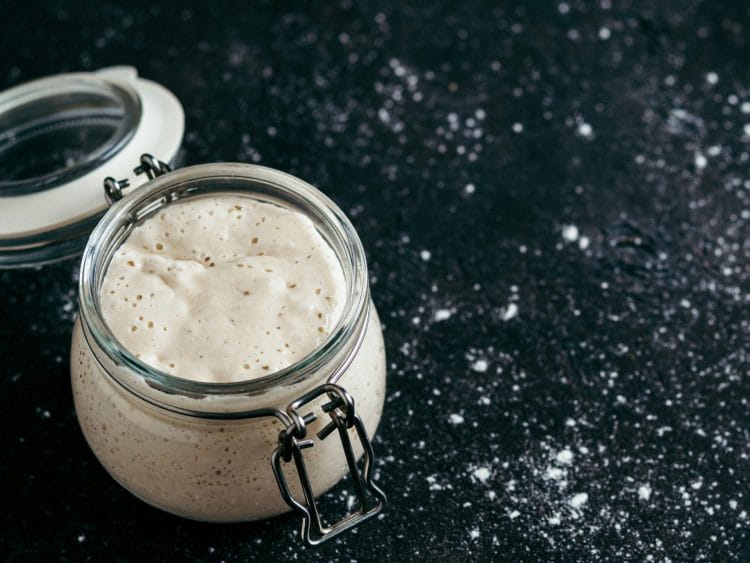Perhaps one of the most-talked about trends in the last three years has been the widespread ‘rise’ of home baking, particularly sourdough-based breads. But sourdough is far from being a new development – it is a rustic and time-honored bread-making tradition that is one of the earliest forms of baking. Beyond its distinct texture and taste, sourdough offers a host of potential health benefits.
In recent years, research has shed light on its positive impact on brain health, making it more than just a delicious choice for your morning toast.
This article explores the essence of sourdough, its unique qualities, and how it may enhance brain health, supported by scientific evidence.
What Is Sourdough? And How Does It Differ From Other Bread Product?
Baking with sourdough involves a characteristic fermentation process using natural yeasts known as Saccharomyces cerevisiae. In a mixture of just flour and water (ie. the ‘sourdough starter’ mixture), the naturally occurring yeast will begin to grow, forming colonies in association with lactic acid bacteria (LAB) that kickstart the fermentation process.
Sourdough fermentation is a complex biochemical transformation driven by the activity of LAB and natural yeast. As the starter culture grows, LAB begins to break down sugars in the flour which get metabolized by the yeast into two key byproducts: carbon dioxide and ethyl alcohol.
While the ethyl alcohol evaporates during the fermentation process, the carbon dioxide gas creates pockets of air within the dough, causing it to rise and giving sourdough its characteristic airy structure. During fermentation, LAB produces a number of acids which serve two purposes: these organic acids give sourdough its classically ‘sour’ taste, and they create an acidic environment which inhibits the growth of harmful bacteria, helping to preserve the bread for a longer shelf life.
causing it to rise and giving sourdough its characteristic airy structure. During fermentation, LAB produces a number of acids which serve two purposes: these organic acids give sourdough its classically ‘sour’ taste, and they create an acidic environment which inhibits the growth of harmful bacteria, helping to preserve the bread for a longer shelf life.
It is the fermentation process that both reduces the gluten content in sourdough and makes the nutrients within flour (like Vitamin B-12, Zinc, Calcium, and Folate) more easily digested and incorporated through the gut.
A 2011 article published in the Journal of Cereal Science led by a team out of Spain investigated the link between sourdough and the gut-brain axis. All whole-grain baked goods and cereals are valuable and rich sources of fiber, vitamins, and micronutrients – but the ingredients and baking process can impact the way in which we absorb these minerals.
Phytates are a naturally occurring compound found in wheat, cereal and legumes, that passes through the digestive tract unabsorbed as humans lack the enzymes necessary to break it down. Phytates will typically bind to the micronutrients in flour, making these minerals less available for you to absorb through the gut.
Sourdough fermentation creates an acidic environment and lowers the phytate concentration by up to 70%! This process allows for an increased uptake of iron, calcium and zinc – allowing for these nutrients to be utilized by the body as building blocks.
Building on the science behind sourdough’s effects on the gut, a follow-up article in the 2021 edition of Food Microbiology based out of Italy analyzed the gut microbiome of individuals who consumed either sourdough bread, or bread made from baker’s yeast (which is the type that you can buy in the grocery store aisles).
The team found that on average, individuals who were fed the sourdough bread had a microbiome that was richer in short chain fatty acids and amino acids throughout the colon. These results suggest that again, the fermentation process seems to have positive impacts on the composition of the gut microbiome.
 Through the gut-brain axis, a balanced microbiome has been linked to improved mood, reduced levels of inflammation, and better overall cognitive function. While studies are still emerging in this exciting field, research has linked probiotic supplementation and diets rich in fermented foods with decreased stress response, anxiety and overall markers of inflammation.
Through the gut-brain axis, a balanced microbiome has been linked to improved mood, reduced levels of inflammation, and better overall cognitive function. While studies are still emerging in this exciting field, research has linked probiotic supplementation and diets rich in fermented foods with decreased stress response, anxiety and overall markers of inflammation.
Interestingly, this relationship between the gut and the brain goes in both directions – psychological stress and depression have both been shown to correlate with alterations in the gut microbiome and have been linked with symptoms of abdominal pain, bloating and cramping.
With bread making up about 10% of the typical adult caloric intake, there is a great potential to seek out a more nutrient-dense option that can enhance our physical and emotional health through positive benefits in the gut microbiome.
The fermentation process not only imparts a unique flavor and texture – but also offers potential benefits on improved digestion, absorption of nutrients and optimization of the gut-brain axis. So, the next time you savor a slice of freshly baked sourdough, you can do so knowing that it might be nourishing both your taste buds and your brain.





